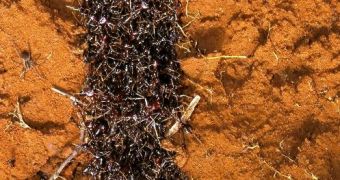Researchers at the University of Cambridge and the University of Washington announce the discovery of a complex set of mental arithmetics in certain tropical bird species. This behavior allows the animals to keep track of when army ants carry out raids, so that they can feast on the dislodged insects.
Army ant colonies function in cycles, alternating periods of intense scavenging and raids on the surrounding forest floor with periods of general inactivity. Certain bird species have learned to accompany the ants on their raids, so as to have higher chances of catching fleeing insects.
But it would have been of no particular evolutionary advantage for the birds to wait for the ants to go on raids without scavenging at the same time. The solution they found was ingenious and simple – they learned to memorize and calculate when each ant colony in their area of influence raids the forest.
Given that the temporary nest sites army ants build during periods of inactivity are called bivouacs, researchers have termed the birds' behavior bivouac checking. Details of the new investigation appear in the October 14 issue of the esteemed journal Behavioral Ecology.
A species of large-brained crow called the scrub jay is capable of keeping mental track of multiple army ant colonies at the same time, remembering when each of them is active and inactive, and then planning their daily flights according to colonies' activity patterns.
After the end of each raid, the birds accompany the ants back to their bivouacs, and memorize the location. After the ants move, the birds return to the previous location, and then fly in a scanning patterns looking for the new bivouac spot.
What is so interesting about this course of action is that it constitutes a sort of mental time-travel. The birds anticipate that they will need to know the location of each bivouac in order to feed the next day, so they find these locations even before they are hungry.
“We suspect that future planning could be involved in bivouac-checking bird behavior because the birds were checking bivouacs when they were not hungry, a behavior that does not make sense until the next morning upon return to the bivouac when the bird finds the ants raiding again and encounters its next meal – a delayed benefit,” Corina Logan explains.
The University of Cambridge expert was the leader of the new author alongside UW colleague Sean O’Donnell. The investigation was carried out in the forests of Monteverde, Costa Rica.

 14 DAY TRIAL //
14 DAY TRIAL //